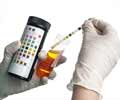A collection of new reports has indicated that frequent self-monitoring of blood glucose (SMBG) by patients of type 1 or type 2 diabetes, and their subsequent alteration of their treatment
A collection of new reports has indicated that frequent self-monitoring of blood glucose (SMBG) by patients of type 1 or type 2 diabetes, and their subsequent alteration of their treatment regimens may help them attain improved glucose control.
The collection of papers deal with the clinical, practical, and economic implications of SMBG, and it includes papers probing the technology behind state-of-the-art glucose meters and self-monitoring techniques, SMBG in pregnancy, and SMBG in the Asia-Pacific Region."Increased frequency of self-monitoring of blood glucose (SMBG) has been shown to significantly improve glucose control. SMBG not only complements A1C results, it guides the patient for self-management of diabetes at home on a day-to-day basis," wrote Editor-in-Chief, Satish K. Garg, MD, Professor of Medicine and Pediatrics at the University of Colorado at Denver and Health Sciences Center, in a supplement overview.
In one of the articles titled, "The Utility and Recent Advances in Self-Monitoring of Blood Glucose in Type 1 Diabetes," Shoba Subramanian, MD, and Irl Hirsch, MD, of the University of Washington, Seattle, has reviewed the evidence supporting frequent SMBG, recent advances in glucose meters and SMBG data processing and how it can be applied for more effective type 1 diabetes management. They have also said that the potential barriers to use of frequent SMBG that limit its applicability
In "Systematic Review of the Benefits of Self-Monitoring of Blood Glucose on Glycemic Control in Type 2 Diabetes Patients," researchers from Silpakorn University, Nakhon-Pathom, Thailand, and Mahidol University, Bangkok, have focussed on type 2 diabetes. They have now concluded that SMBG can yield a significant decrease in HbA1C levels in patients with type 2 diabetes when the results of SMBG are used to adjust therapeutic regimens. They describe the benefits of SMBG
In another report, "The Future of Self-Monitored Blood Glucose: Mean Blood Glucose Versus Glycosylated Hemoglobin," Roger Mazze, PhD, from the University of Minnesota Medical School, Minneapolis, has laid emphasis on the importance of SMBG in monitoring diurnal glucose patterns, instead of relying solely on HbA1C or mean glucose levels, which can be misleading indicators of therapeutic efficacy.
The collection of these reports appears in the Special Supplement to the June 2008 issue of Diabetes Technology Therapeutics.
Advertisement
SPH











